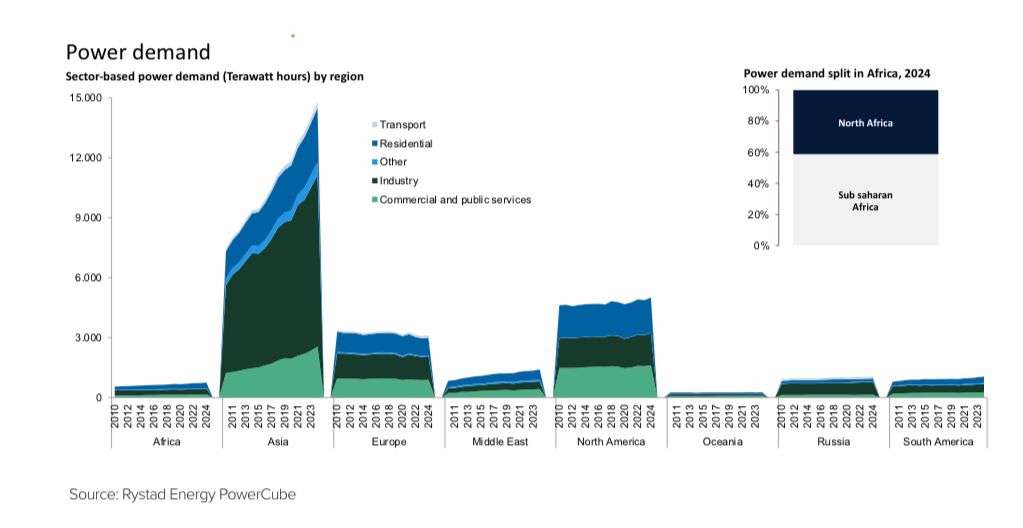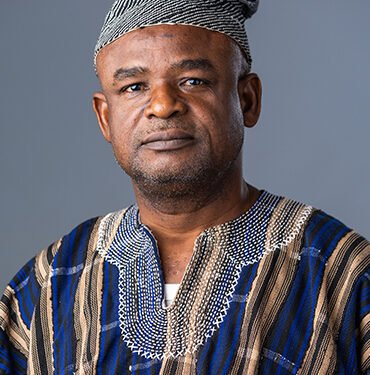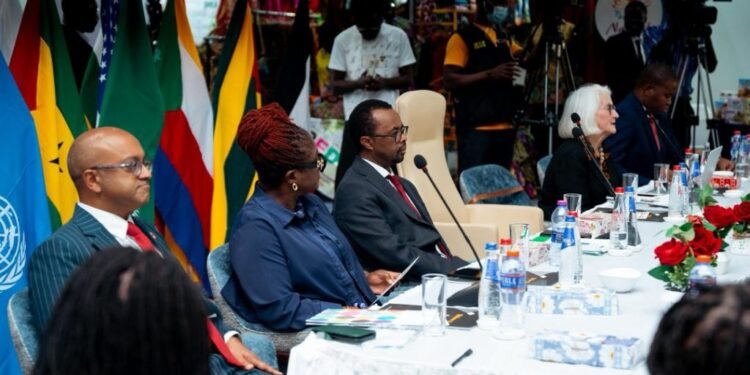The State of African Energy Report 2025 has shed light on a stark contrast between Africa’s abundant natural resources and its lagging power sector.
According to the report, despite being home to significant renewable energy potential and housing nearly one-fifth of the world’s population, Africa lags behind other regions in terms of total power supply and power consumption per capita.
“South America, a continent with comparable geographical conditions but one-third the population, had a per capita power demand close to 2,300 kilowatt-hours (kWh) in 2023, compared to around 418 kWh in Africa.”
State of African Energy Report 2025
This means the average South American consumes five times more electricity than their African counterpart, despite South America having just one-third of Africa’s population.
The gap widens further when compared to Europe, where the per capita power demand exceeds 5,000 kWh. These figures highlight a significant disparity that places Africa at a disadvantage in its pursuit of industrialization, economic growth, and quality of life improvements.
The report pointed to low economic activity and limited gross domestic product (GDP) per capita as critical factors impacting Africa’s energy consumption. In many African nations, low-income levels restrict the purchasing power of households and businesses, forcing them to limit their electricity usage to manage expenses.
“High power prices relative to income levels exacerbate this issue,” the report noted. “Limited power demand from energy-intensive appliances and services on a wider scale, further weakens power consumption per capita.”
Africa’s power infrastructure has struggled to keep pace with its rapid population growth and urbanization. Existing power systems are plagued by frequent outages, aging equipment, and insufficient capacity, which restrict the ability of consumers to access and utilize electricity effectively.
Compounding the issue is the rural-urban divide. Rural areas, where a significant portion of Africa’s population resides, remain largely underserved due to the high costs associated with extending grids to remote locations.
Instead, many households rely on alternative energy sources such as biomass and kerosene for cooking and heating. These alternatives are not only less efficient than electricity but also environmentally unsustainable, further hindering development.
The report also identified unreliable electricity supply as a deterrent to industrial investment and economic growth, perpetuating Africa’s lag in energy consumption.
Regional Dynamics: North Africa Leads the Way

Africa’s energy market is geographically divided into two primary regions: North Africa and sub-Saharan Africa.
The report highlighted the dominance of North Africa, comprising Algeria, Egypt, Eritrea, Libya, Morocco, Sudan, and Tunisia, in the continent’s power market.
“Collectively referred to as North Africa – comprise the largest regional power market in Africa, accounting for nearly 40% the continent’s power demand,” the report said.
North African nations benefit from relatively advanced power infrastructures and higher levels of economic development compared to sub-Saharan Africa.
Countries like Egypt and Morocco, for instance, have made significant investments in renewable energy projects, such as large-scale solar farms and wind power installations, positioning themselves as leaders in Africa’s energy transition.
In contrast, the report noted that “sub-Saharan Africa faces more pronounced challenges, including widespread energy poverty, limited electrification, and an overreliance on inefficient energy sources.”
The disparity between the two regions underscores the need for tailored strategies to address Africa’s diverse energy challenges.
Despite the bleak statistics, the State of African Energy Report 2025 is optimistic about Africa’s energy future. The continent’s vast renewable energy potential, particularly in solar and wind power, offers a promising solution to its energy crisis.
The Sahara Desert, for example, provides an ideal location for large-scale solar energy projects that could meet both domestic and international energy demands.
The report also emphasize d the importance of regional collaboration to overcome common challenges. Initiatives such as the African Union’s Agenda 2063 and the African Continental Free Trade Area (AfCFTA) could play a pivotal role in creating a unified energy market, fostering innovation, and accelerating the continent’s energy transition.
READ ALSO: Global Summit in South Korea Targets Plastic Crisis























